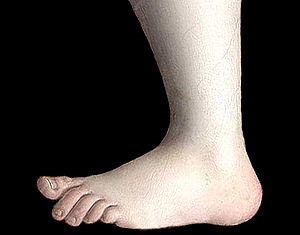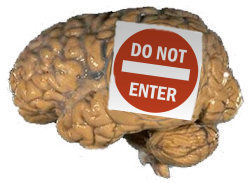The Unfortunate Sex Life of the Banana
Written by Matt Castle on 24 August 2009
 The humble banana almost seems like a miracle of nature. Colourful, nutritious, and much cherished by children, monkeys and clowns, it has a favoured position in the planet’s fruitbowls. The banana is vitally important in many regions of the tropics, where different parts of the plant are used for clothing, paper and tableware, and where the fruit itself is an essential dietary staple. People across the globe appreciate the soft, nourishing flesh, the snack-sized portions, and the easy-peel covering that conveniently changes colour to indicate ripeness. Individual fruit—or fingers—sit comfortably in the human hand, readily detached from their close-packed companions. Indeed, the banana appears almost purpose-designed for efficient human consumption and distribution. It is difficult to conceive of a more fortuitous fruit.
The humble banana almost seems like a miracle of nature. Colourful, nutritious, and much cherished by children, monkeys and clowns, it has a favoured position in the planet’s fruitbowls. The banana is vitally important in many regions of the tropics, where different parts of the plant are used for clothing, paper and tableware, and where the fruit itself is an essential dietary staple. People across the globe appreciate the soft, nourishing flesh, the snack-sized portions, and the easy-peel covering that conveniently changes colour to indicate ripeness. Individual fruit—or fingers—sit comfortably in the human hand, readily detached from their close-packed companions. Indeed, the banana appears almost purpose-designed for efficient human consumption and distribution. It is difficult to conceive of a more fortuitous fruit. The banana, however, is a freakish and fragile genetic mutant; one that has survived through the centuries due to the sustained application of selective breeding by diligent humans. Indeed, the “miraculous” banana is far from being a no-strings-attached gift from nature. Its cheerful appearance hides a fatal flaw— one that threatens its proud place in the grocery basket. The banana’s problem can be summed up in a single word: sex.
Read the rest of this article »
 Marvin Heemeyer of Granby, Colorado was a profoundly frustrated muffler repair man. In the late 1990s–after years of protests, petitions, and town meetings–it became obvious to the 52-year-old that he was entwined in a gross miscarriage of justice. His business was ruined by some shady zoning changes, and Heemeyer contended that mayor and city council were corrupt. Even as he was forced to give up his legal fight and sell his land, he hatched one last plan to secretly retool his muffler shop to serve a single malevolent purpose: to construct a machine that would allow him to exact his revenge upon those who had wronged him.
Marvin Heemeyer of Granby, Colorado was a profoundly frustrated muffler repair man. In the late 1990s–after years of protests, petitions, and town meetings–it became obvious to the 52-year-old that he was entwined in a gross miscarriage of justice. His business was ruined by some shady zoning changes, and Heemeyer contended that mayor and city council were corrupt. Even as he was forced to give up his legal fight and sell his land, he hatched one last plan to secretly retool his muffler shop to serve a single malevolent purpose: to construct a machine that would allow him to exact his revenge upon those who had wronged him.

 Most people think of the “mentally disordered” as a delusional lot, holding bizarre and irrational ideas about themselves and the world around them. Isn’t a mental disorder, after all, an impairment or a distortion in thought or perception? This is what we tend to think, and for most of modern psychology’s history, the experts have agreed; realistic perceptions have been considered essential to good mental health. More recently, however, research has arisen that challenges this common-sense notion.
Most people think of the “mentally disordered” as a delusional lot, holding bizarre and irrational ideas about themselves and the world around them. Isn’t a mental disorder, after all, an impairment or a distortion in thought or perception? This is what we tend to think, and for most of modern psychology’s history, the experts have agreed; realistic perceptions have been considered essential to good mental health. More recently, however, research has arisen that challenges this common-sense notion. “I don’t remember things,” Henry explained to the unfamiliar female interviewer. She seemed very curious about how he spends a typical day, and about what he had eaten for breakfast, but his efforts to summon the information from his mind were fruitless. He could easily answer her questions regarding his childhood and early adult years, but the indefinite expanse of time since then was bereft of memories. In fact, from moment to moment Henry feels almost as though he has just awakened from a deep sleep, with the fleeting remnants of a dream always just beyond his grasp. Each experience, dull or dramatic, evaporates from his memory within a few dozen heartbeats and leaves no trace.
“I don’t remember things,” Henry explained to the unfamiliar female interviewer. She seemed very curious about how he spends a typical day, and about what he had eaten for breakfast, but his efforts to summon the information from his mind were fruitless. He could easily answer her questions regarding his childhood and early adult years, but the indefinite expanse of time since then was bereft of memories. In fact, from moment to moment Henry feels almost as though he has just awakened from a deep sleep, with the fleeting remnants of a dream always just beyond his grasp. Each experience, dull or dramatic, evaporates from his memory within a few dozen heartbeats and leaves no trace.
కామెంట్లు లేవు:
కామెంట్ను పోస్ట్ చేయండి